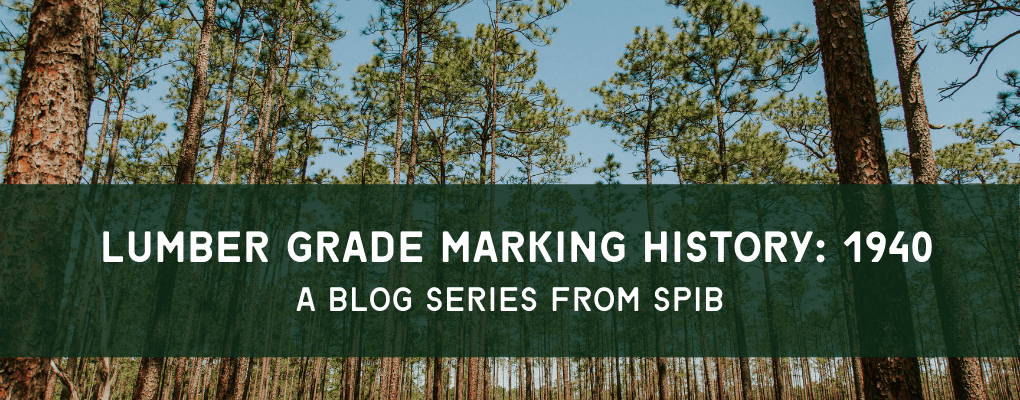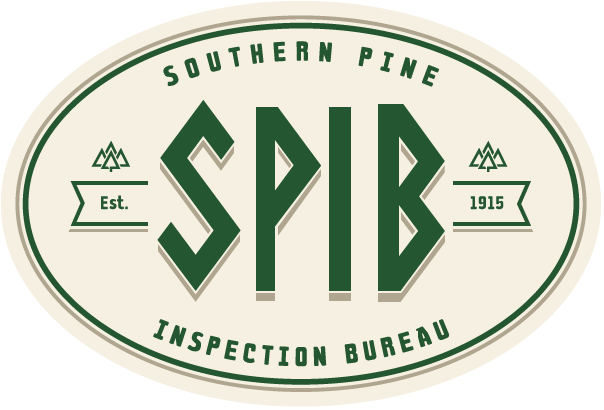
Lumber Grade Marking History: 1940
Introduction
On January 4, Luftwaffe Colonel Hermann Goring would assume control over most of the war industries in Germany – bringing with him harrowing implications for Europe during a time when World War II (as it would soon become known) was still in its early stages. Just a few days later, on the 6th, General Semyon Timoshenko took command of all Soviet forces – and somehow, the first week of the year wasn’t even over yet.
In this section, you will also learn more about how 1940 was a particularly precarious year for the lumber industry and an essential one if we were ever going to get to the point where we are today. It was that the Temporary National Economic Committee (otherwise known as the TNEC), acting through the Department of Justice, including the Southern Pine Association, in a nationwide investigation of ALL phases of the building industry.
The SPA was indicted on February 21 of that year on charges of antitrust law violations and more. All told, 30 different corporations and individuals – including those who were SPA members – were named in the indictment.
You will learn about how allegations were held to be in restraint of free trade. While that is certainly debatable, SPA immediately declared that it did NOT sponsor any illegal activities. You will find out more about the long-term ramifications of these events, many of which we’re still feeling to this day one way or the other. We hope you find it to be yet another enlightening step on the larger journey of an entire industry.
1940.
The Temporary National Economic Committee (TNEC), acting through the U. S. Department of Justice (FBI), included SPA in the Government’s nationwide investigation of all phases of the building industry in the late part of 1939. On February 21, 1940, SPA was indicted, following its plea of nolo contendere, charging anti-trust law violations, based on Section 2 of the Sherman Anti-Trust Act. Thirty corporations, SPA members, were named in the indictment. Civil actions were filed, and consent decrees were entered – to prevent repetition of the practices complained of and to provide for different trade practices.
The Southern Pine Lumber Exchange (D. H. Cloud), New Orleans, La., and the National Association of Commission Lumber Salesmen (Maurice Grundy), Cleveland, Ohio, were included; charged with compiling and issuing periodic statistical data which did not reflect the true picture of the industry, and sponsoring informative addresses setting uniform and non-competitive prices, respectively.
Allegations were held to be in restraint of free trade. While debatable as to their correctness or incorrectness, SPA declared it did not sponsor any illegal activities but consented to the decree to avoid litigation expense and coincident hindrances.
The complaint pointed out that:
-
- A system of practices controlled the southern pine market to the exclusion of the small direct-to-consumer mill.
-
- The issuing of monthly and annual statements showing shipment, orders, stocks on hand, and comparative data relative to increases and decreases in sales volume by which members were more fully informed of the lumber situation than non-members.
-
- Grade, grade marking, and inspection rules and practices arbitrarily, unreasonably, and without a warrant were formulated, which misused the standardization program of the American Lumber Standards for the purpose of illegally enhancing the influence and control of its subscribers over lumber distribution.
-
- SPA misrepresented that a necessity existed for the requirement of grade marked trade-marked lumber in all lumber construction. SPA sponsored lumber dealer’s cooperative sales promotion plans in New Orleans, Dallas, Detroit, Miami, Memphis, and other places where through advertising, interest was created in grade marked trademarked lumber.
-
- SPA detailed inspectors examined lumber being used in construction over a wide area and that lumber other than SPA marked was termed inferior because of moisture content or some other reason – resulting in SPA publicity to show the superiority of SPA marked lumber which was misleading by knowingly concealing and failing to give publicity to other favorable findings and reports of the same inspectors.
-
- Southern Pine Inspection Service (SPIS) to non-member mills cost nine cents per M board feet, by means of which SPA strengthened, continued, and maintained an unlawful regulation and control of trade and commerce.
-
- Promotional campaigns recognized retailers as sole distributors except in the case of governmental departments, shipyards, dock builders, railroads, and large users of industrial lumber – direct-to-the-consumer selling mills were blacklisted.
The consent decrees stipulated divorcement of the grading rules and inspection service from SPA activities; prohibited use of the association grade mark symbols of SPA and SPIS, or any other mark except those of individual mills; permitted each association in the southern pine region to name one member from each state to membership of a board of governors; allowed lumber inspections at any mill at cost, and arranged to offset SPA influence by authorizing the mills in each state to name two members, from each state to the board of governors. Other restrictions covered general phases of production, schedules, and prices. To guarantee enforcement, the Federal Court in New Orleans was given perpetual jurisdiction.
Supported by factual evidence of its policies, practices, and accomplishments during the 25 years of its existence and service to the southern pine lumber industry, the Southern Pine Association statement, Feb. 22, 1940, was proper. Its organized efforts for the production of well manufactured and seasoned lumber, eliminating grade substitution, jerry-building, and protecting the home builder and consumer were commendable.
-
- The Southern Pine Association in these proceedings was in no manner singled out for investigation by the department of justice because of any suspected flagrant violation of the law, but the inquiry into the association’s affairs and the subsequent proceedings are a part of the government’s investigation of the entire building industry of the country, which has for its purpose the prevention of practices in restraint of competition and trade in the building industry.
- The Southern Pine Association in these proceedings was in no manner singled out for investigation by the department of justice because of any suspected flagrant violation of the law, but the inquiry into the association’s affairs and the subsequent proceedings are a part of the government’s investigation of the entire building industry of the country, which has for its purpose the prevention of practices in restraint of competition and trade in the building industry.
-
- The Southern Pine Association is in complete sympathy with the purpose of the investigation and, in fact, has always endeavored to lower the cost of home building and to provide the proper kind of lumber for home construction.
- The Southern Pine Association is in complete sympathy with the purpose of the investigation and, in fact, has always endeavored to lower the cost of home building and to provide the proper kind of lumber for home construction.
-
- The Southern Pine Association did not and does not admit any illegality in its activities, as alleged in the complaint filed by the government, and did not sponsor any such illegal activities.
-
- The association never has undertaken and does not desire to undertake any activities in contravention of the anti-trust laws, but rather than interrupt or hinder the association’s widespread program of benefits and service to the industry, and to obviate any large expense that might be caused by protracted litigation, with the resulting confusion in the industry and uncertainty on the part of subscribing manufacturers, the association thought it wise to enter into the consent decree.
-
- The association, in conducting its activities over a period of 25 years, has always been mindful of the public interest and will continue to operate to the end that the public will be protected in the purchase of lumber. Throughout the 25 years of its existence, all affairs of the association have been conducted openly and aboveboard, and its complete records and files always have been readily available to authorize public officials.
-
- The consent decree requires the separation of the grading rules, inspection, standardization, and grade marking activities from the other activities of the association, which comprise trade promotion, traffic and freight rates, statistics, conservation, and legislative problems of the industry.
-
- In the decree, a plan is set forth for the establishment of a Southern Pine Inspection Bureau, within the association, under whose jurisdiction all matters relating to grading rules, standardization, inspection, and grade marking will be handled at the actual cost of its services.
-
- This bureau will be autonomous, guided by a board of governors selected by the subscribers to the bureau. It was because of the semipublic nature of the grading, inspection, and grade marking service that all interested have agreed that it should be handled on the basis outlined in the decree, separate from the other activities of the Southern Pine Association.
-
-
- The Southern Pine Association always has made all of its services available to all manufacturers of Southern pine who were qualified to meet with required standards of manufacture, grading, etc., without discrimination, and the association already had made inspection and grade marking services available on an actual cost basis to all manufacturers of southern pine without discrimination and regardless of affiliation with the Southern Pine Association.
-
<br/ >Plans contemplate a Southern Pine Inspection Bureau as prescribed by the consent decree. An industry-wide meeting in this connection is called for March 29, 1940. On or before May 15, 1940, a second meeting provides for the election of the board of governors by the bureau’s subscribers. The bureau expects to begin operation in June. As an independent affiliate of the SPA, it will handle all grading, standardization, inspection, and grade marking activities of the industry for any manufacturer at cost.
